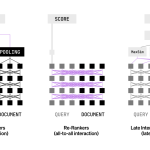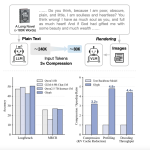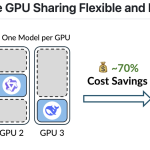Artificial Intelligence
Microsoft Releases Agent Lightning: A New AI Framework that Enables Reinforcement Learning (RL)-based Training of LLMs for Any AI Agent
PositiveArtificial Intelligence
Microsoft has unveiled Agent Lightning, an innovative open-source framework designed to enhance reinforcement learning for AI agents. This tool allows developers to convert real agent traces into RL transitions, optimizing multi-agent systems without the need to alter existing setups. By separating training from execution, Agent Lightning streamlines the process, making it easier for teams to implement advanced AI solutions. This release is significant as it empowers developers to leverage reinforcement learning more effectively, potentially leading to breakthroughs in AI capabilities.
Liquid AI Releases LFM2-ColBERT-350M: A New Small Model that brings Late Interaction Retrieval to Multilingual and Cross-Lingual RAG
PositiveArtificial Intelligence
Liquid AI has just launched LFM2-ColBERT-350M, a groundbreaking compact model designed for multilingual and cross-lingual retrieval. This innovative system allows documents to be indexed in one language while enabling queries in multiple languages, all while maintaining high accuracy and fast inference. This advancement is significant as it enhances accessibility and efficiency in information retrieval across diverse languages, making it easier for users worldwide to find relevant content.
How Exploration Agents like Q-Learning, UCB, and MCTS Collaboratively Learn Intelligent Problem-Solving Strategies in Dynamic Grid Environments
PositiveArtificial Intelligence
This article dives into the fascinating world of exploration agents like Q-Learning, UCB, and MCTS, showcasing how they collaboratively learn to solve problems in dynamic grid environments. By training these agents to navigate obstacles and reach goals efficiently, the tutorial highlights the importance of exploration strategies in intelligent decision-making. This knowledge is crucial as it can lead to advancements in AI and robotics, making systems smarter and more adaptable.
MiniMax Releases MiniMax M2: A Mini Open Model Built for Max Coding and Agentic Workflows at 8% Claude Sonnet Price and ~2x Faster
PositiveArtificial Intelligence
MiniMax has just launched the MiniMax M2, an innovative open-source model designed to enhance coding and agentic workflows at a significantly lower cost than flagship models. Priced at just 8% of Claude Sonnet, this model promises to deliver nearly double the speed, making it an exciting option for developers looking to optimize their coding processes. The release is particularly important as it democratizes access to advanced AI tools, allowing more users to leverage powerful coding capabilities without breaking the bank.
Zhipu AI Releases ‘Glyph’: An AI Framework for Scaling the Context Length through Visual-Text Compression
PositiveArtificial Intelligence
Zhipu AI has unveiled Glyph, an innovative AI framework designed to enhance the processing of long texts by converting them into images, achieving impressive token compression. This breakthrough allows for scaling context lengths significantly, which is crucial for handling larger workloads in AI applications. The ability to maintain accuracy while increasing capacity is a game-changer for developers and researchers alike, as it opens up new possibilities for more efficient data processing and analysis.
Meet Pyversity Library: How to Improve Retrieval Systems by Diversifying the Results Using Pyversity?
PositiveArtificial Intelligence
Meet Pyversity, a new Python library that enhances retrieval systems by diversifying search results. Traditional retrieval methods often yield similar items, causing redundancy. Pyversity tackles this issue by re-ranking results to highlight relevant but less common items, making searches more effective. With its user-friendly API and support for various diversification strategies, Pyversity is set to revolutionize how we retrieve information, ensuring users find what they truly need.
How to Build a Fully Interactive, Real-Time Visualization Dashboard Using Bokeh and Custom JavaScript?
PositiveArtificial Intelligence
This tutorial on building a fully interactive data visualization dashboard using Bokeh and Custom JavaScript is a game-changer for anyone looking to enhance their data presentation skills. It guides you through transforming raw data into engaging visual plots, adding features like linked brushing and real-time filters. This is important because it empowers users to create dynamic dashboards that can provide deeper insights and improve decision-making processes.
How to Build an Agentic Decision-Tree RAG System with Intelligent Query Routing, Self-Checking, and Iterative Refinement?
PositiveArtificial Intelligence
This tutorial introduces an innovative Agentic Retrieval-Augmented Generation (RAG) system that enhances traditional question answering by intelligently routing queries, checking answer quality, and refining responses. This approach is significant as it leverages open-source tools, making advanced AI accessible and improving the accuracy of information retrieval, which is crucial in today's data-driven world.
Meet ‘kvcached’: A Machine Learning Library to Enable Virtualized, Elastic KV Cache for LLM Serving on Shared GPUs
PositiveArtificial Intelligence
The introduction of 'kvcached' marks a significant advancement in machine learning, particularly for large language model (LLM) serving. This innovative library allows for a virtualized and elastic key-value cache, optimizing GPU memory usage by adapting to varying request loads. Developed by researchers at Berkeley's Sky Computing Lab, 'kvcached' addresses the common issue of wasted GPU resources, making it a game-changer for developers and researchers who rely on shared GPUs. This development not only enhances efficiency but also paves the way for more sustainable AI practices.







